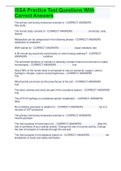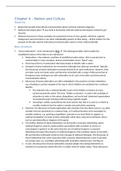Inhoud
Lecture summaries in short:...................................................................................................................2
Lecture 2 – power and the environment................................................................................................4
Lecture 3 – modernity & environment...................................................................................................6
Lecture 4: Environmental Authoritarianism & Fascism...........................................................................9
Lecture 5 – Eco-socialism......................................................................................................................11
Lecture 6 - Colonialism, Racism, and Environmental Justice.................................................................13
Lecture 7 - Migration, Gender & environment.....................................................................................16
Lecture 8 – The Politics of Eco-Grief, -Guilt & -Anxiety.........................................................................19
Lecture 9 - Climate (In)Action & (Dis)Engagement................................................................................22
MCQ – practise exam............................................................................................................................25
Answers to MCQ...................................................................................................................................30
,Lecture summaries in short:
Lecture 1: Introduction The lecture introduces environmental politics as a multi-sub-
disciplinary field that encompasses various areas such as international relations, comparative
politics, political theory, history, geography, and sociology. The focus of environmental
politics revolves around the environment and concepts like power, equality, justice, and
freedom.
Lecture 2: Power & the Environment This lecture discusses political ecology and how power
shapes the environment in terms of access, use, distribution, and degradation. Political
ecologists pay attention to marginalized groups, such as the working class, and highlight the
social construction of environmental issues. The lecture also explores the examples of water
use in Chile and the historical influence of dominant energy sources like coal and oil on
political activities.
Lecture 3: Modernity & the Environment The third lecture examines modernity and its role
in the environmental crisis. It explains that modernity, characterized by the desire for
knowledge, creation, and control, has led to environmental degradation. The lecture presents
two approaches to addressing the crisis: ecomodernism, which focuses on technological
innovation, and Green Keynesianism, which advocates for state intervention and greening
capitalism.
Lecture 4: Environmental Authoritarianism & Fascism This lecture explores the connections
between anti-modern naturalism, nationalism, and environmental ideologies. It discusses the
historical link between early ecology and German fascism, highlighting the rejection of
modernity, anthropocentrism, and the promotion of nature mysticism within the National
Socialist ideology. The lecture emphasizes the significance of understanding these
connections for environmental politics.
Lecture 5: the focus is on Eco-Socialism, which presents a critical perspective on capitalism
and its role in environmental, social, and political crises. Eco-Socialism advocates for an anti-
capitalist stance and emphasizes the interconnectedness of these crises. It argues that
capitalism's structural contradiction leads to environmental harm by exploiting non-economic
resources while designating them as "non-economic." This contradiction creates free-riding
and crises in the environmental, social, and political domains. By rejecting capitalism and
forming a trans-environmental, anti-capitalist "new block," Eco-Socialism seeks to build
solidarity and coalitions among various groups concerned about different crises.
Lecture 6: the discussion centers around colonialism, racism, and environmental justice. The
lecture highlights the historical context of colonialism and its profound impact on the
environment. Colonialism's practices, such as resource extraction and land dispossession,
have caused significant environmental degradation. Moreover, the lecture underscores that
environmental issues cannot be separated from social and racial injustices. It introduces the
concept of environmental racism, which refers to the disproportionate exposure of
marginalized communities to environmental hazards due to systemic racism. These
communities bear a higher burden of pollution and environmental degradation. Environmental
justice movements aim to address these inequities and advocate for fair distribution of
environmental benefits and burdens.
, Lecture 7: This lecture explores the impact of language and conceptualization on climate-
related movement (CRM), focusing on migration, gender, and the environment. It discusses
the complexities of CRM and the challenges in applying existing refugee law. The text
critiques the use of terms like "climate refugee" and "climate migrant," highlighting their
implications. It also delves into the management of climate insecurity for continuous capital
accumulation, which often disempowers migrants. The lecture concludes by introducing
ecofeminism as an alternative approach to overcoming the domination of both woman and
nature, emphasizing critical ecological feminism as a means to break down hierarchies and
recognize humanity's connection to nature.
Lecture 8: explores the concept of framing in environmental communication. Framing refers
to the way information is presented and interpreted, shaping people's understanding and
opinions on environmental issues. Different frames can influence how individuals perceive
problems, assign responsibility, and consider potential solutions. The lecture discusses various
framing strategies, such as emphasizing economic costs, public health risks, or moral
obligations. It also highlights the role of media in framing environmental issues and the
challenges of effectively communicating complex scientific information to the public.
Lecture 9 delves into the factors that contribute to climate inaction and disengagement. It
explores the concept of depoliticization in environmental communication, which positions
people as passive recipients of information rather than active participants in political
processes. The lecture examines scientization, economization, and moralization as three forms
of depoliticized environmental discourse that discourage citizen engagement. It also discusses
the importance of repoliticizing the environment through activist efforts and the challenges
faced by environmental nonviolent civil disobedience. The lecture concludes by highlighting
the need for a rich set of options to address climate challenges while considering democratic
principles.




